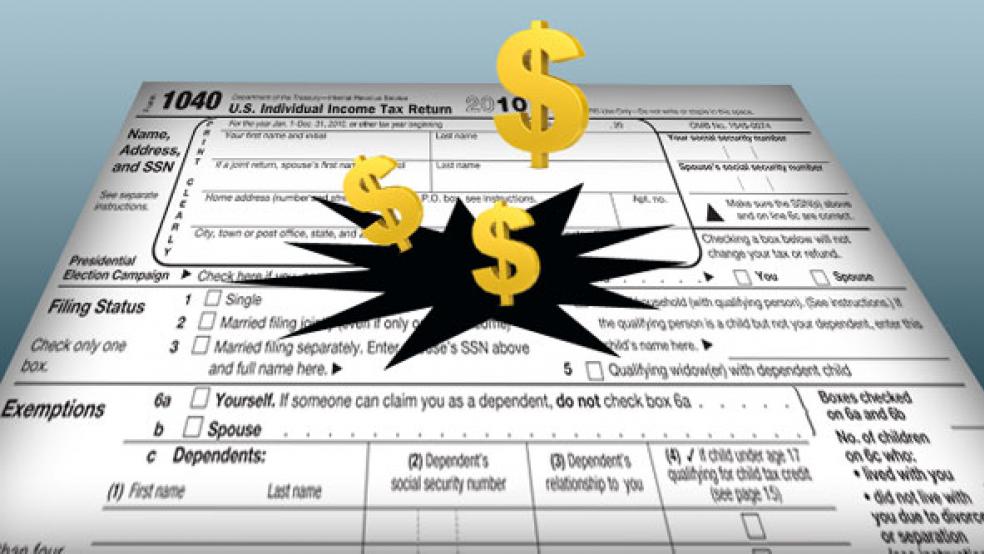There’s a common misperception about the fiscal cliff — that the tax increases only apply to 2013. Not true.

In a cruel epilogue to 2012, roughly 28 million families would owe the IRS $84 billion more than they anticipated for this year should the country plunge off the cliff, according to the nonpartisan Tax Policy Center.
Those families would face the “Alternative Minimum Tax,” which was introduced in 1969 to supposedly guarantee that wealthy Americans could not elude the taxman. But the AMT not only flopped, it was never indexed to inflation. So with each passing year, it seeps away from high society and into the wallets of Target and Wal-Mart shoppers. That sets up a disaster for April 15.
“Because most affected taxpayers will not have put aside money for it either through withholding or estimated taxes, it will cause more hardship in April than tax increases usually do,” Eric Toder, co-director of the Tax Policy Center, told The Fiscal Times. “The economy is facing huge risks from what could be entirely self-inflicted wounds.”
After a manic Thursday on Capitol Hill, lawmakers were treading through waves of cynicism and desperation. Senate Majority Leader Harry Reid, D-Nev., predicted yesterday morning that the country would enter the New Year without a deal to stop more than $600 billion worth of automatic tax hikes and spending cuts. House Speaker John Boehner, R-Ohio, called his chamber into session for Sunday — two days before the year-end deadline.
“You cannot legislate with yourself,” a frustrated Reid said in a Thursday afternoon floor speech. “We have nobody to work with.”
His Senate Republican counterpart, Mitch McConnell, R-Ky., labored in a rival speech to shift the blame onto Democrats, saying he expects President Obama to submit a new proposal that can clear both chambers. “Hopefully, there is time for an agreement of some kind that saves the taxpayers from a wholly, wholly preventable crisis,” McConnell said.
Congress usually approves an AMT patch each year to account for inflation, but lawmakers bypassed the annual fix this time in hopes of gaining more leverage in cliff negotiations.
Earlier this month, Reid told Bloomberg News that an AMT patch must be accompanied by a measure to preserve lower income tax rates for 98 percent of the country, while the current rates expire on incomes above $250,000. The Fiscal Times reported that Republican lawmakers also viewed the AMT as a tool for hammering out a bargain on their preferred terms.
But the strategies clearly backfired.
The Senate reconvened Thursday without a deal in sight. Obama and Reid reportedly considered an AMT patch as part of a last-minute plan to avoid the rate hikes for much of the country. But Republicans have yet to exhibit much support for any tax increases that aren’t coupled with spending cuts that stabilize the national debt.
As a result of the breakdown, the tens of millions of households exposed to the AMT would need on average to cough up another $2,250 in taxes for 2012, a year that’s practically in the rearview mirror. The payroll tax holiday will also expire in 2013, so families would potentially be grappling with the AMT while coping with less take-home pay.
The bedlam in the halls of Congress will echo through the IRS, which would also have to edit tax forms because it assumed a patch would go through.
“The tax filing season will be very chaotic because of the time it will take the IRS to fix forms affecting millions of taxpayers,” said the Tax Policy Center’s Toder. Such obstacles could snowball into delays in tax filings and refunds.
On the whole, 98 percent of those with incomes between $200,000 to $500,000 would pay an additional $11,000 in AMT this year, according to the center’s estimates. About 88 percent of those with incomes of $100,000 to $200,000 would need to fork over another $3100, and even the majority of Americans with earnings between $75,000 and $100,000 would have an AMT liability.
All of these income groups fit within the definition of “middle class” cited by Democrats such as Obama and the types of “job creators” who Republicans like Boehner claim should be protected from a higher tax burden.
Budget experts and lawmakers understand the threat, but not everyone is panicking.
The Citizens of Tax Justice recently broke down the anticipated costs and concluded that nine-tenths of the $86 billion AMT would be paid by the top 20 percent of earners. Steve Wamhoff, legislative director for the group, says that taxes would return to levels last seen under President Bill Clinton. The AMT would — by many counts — make the tax system slightly more progressive.
“If the AMT takes away some of the Bush tax cuts and causes people – only among the richest 20 percent and mainly among the richest 5 percent of Americans – to pay something closer to what they paid during the end of the Clinton boom years,” Wamhoff said, “it's hard to believe that will hurt our economy.”




